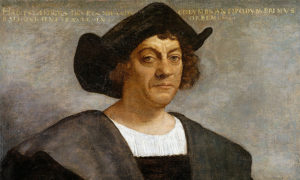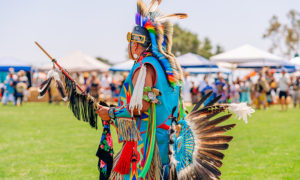Columbus Day history is rife with interesting information, important developments, and even controversy. As you enjoy this coming three-day weekend, make sure to learn the meaning behind this holiday.
Learning About Columbus Day History
Columbus Day is a federal holiday in the United States. The holiday is celebrated on the second Monday of the month of October each year, keeping in line with the Uniform Monday Holiday Act. But, what is the meaning behind this holiday? To understand that, one must first look at the history of Columbus Day.
Who Was Christopher Columbus?
 Christopher Columbus, the holiday’s namesake, was an explorer and navigator who is most known for his “discovery” of the Americas. Columbus was born in 1451 in Genoa, Italy. And even though he was Italian, it was Spanish King Ferdinand II and Queen Isabella I who financed his trip across the Atlantic Ocean in 1492.
Christopher Columbus, the holiday’s namesake, was an explorer and navigator who is most known for his “discovery” of the Americas. Columbus was born in 1451 in Genoa, Italy. And even though he was Italian, it was Spanish King Ferdinand II and Queen Isabella I who financed his trip across the Atlantic Ocean in 1492.
Interestingly enough, Columbus was originally searching for an alternate path to the Far East. He sailed with three ships: the Santa Maria, the Nina, and the Pinta. Following months at sea, Columbus stumbled upon the New World. While the Santa Maria did not survive the return trip, Columbus would eventually sail to the New World an additional three times before his death in 1506. He died a mere two years after his final trip to the New World.
In death, Columbus would not stay in one place for long, just as he did in life. He was initially laid to rest in Valladolid, Spain, before being moved to Seville. He would stay there for a time, while a cathedral in the New World was in the midst of construction. In 1542, he moved to the cathedral and remained there for 200 years.
Columbus’ remains were again moved a few more times, but it was at this point that things started becoming unclear. While Columbus was supposedly buried in the Cathedral at Seville, another body was found in the Dominican Republic, where the explorer’s body also spent some time. The discovered body was thought to belong to his son, Diego, although there is no telling for sure.
From Columbus Day Origins to the Modern Day
Columbus Day started out as a way of celebrating the achievements of the explorer and the “discovery” of the New World. Considering Columbus was also Italian, the day also bears significance for Italian-Americans, who use it as a way to celebrate their heritage.
It was in 1792 that people first commemorated Columbus Day. The commemoration took place on the 300th anniversary of Columbus’ landing in the Americas. A hundred years later, President Benjamin Harrison proclaimed a one-time celebration of Columbus Day on a national level. The declaration came after a mob killed a group of Italian immigrants in New Orleans.
Fast forward to 1907, and Colorado became the first state to officially recognize Columbus Day as a holiday. It was not until 1934 that President Franklin D. Roosevelt officially declared Columbus Day a national holiday.
But, Columbus Day history was not all good and well. Columbus’ arrival in the New World would soon bring death and destruction to the Native Americans who had long called the place home. He enslaved countless indigenous peoples and transmitted diseases, including smallpox and measles. He was brutal in his colonization of the natives and played a key role in the loss of their ways of life.
Early on, Columbus Day served as a way to commemorate the Italian navigator and his arrival in the Americas. Parades took place in several parts of the country, and fairs and festivals littered the streets. As time went on, though, people began to understand the dark history of Columbus Day.
Today, it is no longer as widely celebrated. In fact, out of the federal holidays in the United States, Columbus Day remains the least observed. While many government agencies and banks shut their doors during the holiday, businesses still welcome patrons with wide open arms.
How States Have Responded to the Columbus Day Controversy
 In the United States, Columbus Day is a federal holiday. However, there are a number of states that no longer observe Columbus Day. Recognizing the horrors that Columbus brought upon indigenous people, these states have chosen to celebrate Indigenous People’s Day or Native Americans’ Day instead.
In the United States, Columbus Day is a federal holiday. However, there are a number of states that no longer observe Columbus Day. Recognizing the horrors that Columbus brought upon indigenous people, these states have chosen to celebrate Indigenous People’s Day or Native Americans’ Day instead.
South Dakota was the first state to stop observing Columbus Day in 1990, replacing the holiday with Native Americans’ Day. Other states that have stopped observing Columbus Day include Alaska, New Mexico, Oregon, Maine, Washington, Hawaii, and Vermont. In California, several cities and counties have also followed suit. And then there are also a few states that opt to celebrate both Columbus Day and Indigenous People’s Day.
It is easy to see why many Americans have turned their backs on Columbus Day and choose to celebrate Indigenous People’s Day instead. It’s a way of showing support to Native Americans, who suffered at the hands of the explorer. To them, Columbus Day constitutes a celebration of slavery, dispossession, and genocide. It is a day tainted with blood.
In opposition to Columbus Day, many have started petitions urging the federal government to replace the holiday with Indigenous People’s Day or remove it altogether. Of course, this movement has expectedly encountered some pushback from advocates of the holiday. While President Joe Biden, in 2021, proclaimed October 11 (the second Monday of that year) as Indigenous Peoples’ Day, he also did so for Columbus Day. Only time will tell whether or not Columbus Day will eventually phase out.
A History Lesson You Should Know
Every American should understand Columbus Day history and not just blindly celebrate it. While the holiday is an opportunity to take a three-day weekend and get some relaxation, it is also a day that marks an important period in American history.
RELATED ARTICLES:
- Can The HOA Ask Homeowners To Remove Holiday Cross Display?
- How To Balance HOA Regulations With Holiday Decorations
- Should You Or Should You Not Host An HOA Valentine’s Day Community Event?







